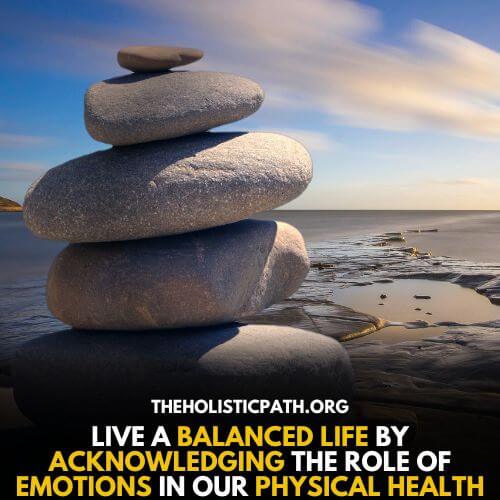Most people think that emotions are just fleeting feelings that come and go without any rhyme or reason. But do emotions get stored in body?
This is a question that has been asked by many over the years, and there is still no clear answer. Some scientists believe that emotions do get stored in the body, while other scientists believe that this is nothing more than a myth.
The purpose of this article is to explore how and why emotions get stored in the body along with figuring out ways to release those pent-up emotions.
What Are Emotions And Where Do They Come From
Emotions are a part of human life. They come from the Latin word emovere, which means “to move.” Emotions are energy in motion. They are created by the body in response to a stimuli.
Emotions are not just feelings. They are also physical sensations.
The source of emotions is the brain. The brain is divided into three parts: the reptilian brain, the limbic system, and the neocortex. The reptilian brain is responsible for instinctual reactions such as fight or flight.
The limbic system is responsible for emotions and memories. The neocortex is responsible for rational thought and problem-solving.
Emotions are first triggered in the limbic system. The limbic system is located in the center of the brain and is responsible for processing emotions and memories.
The limbic system contains the:
- Thalamus – The thalamus acts as a relay center between the brain and the body.
- Hypothalamus – The hypothalamus controls the autonomic nervous system, which regulates involuntary activities such as heart rate, respiration, and digestion.
- Hippocampus – The hippocampus is responsible for memory formation.
- and Amygdala – The amygdala is responsible for fear and aggression.
The emotions that we experience are a result of what is going on in our lives at any given moment. They can be triggered by something that we see, hear, smell, taste, or touch. Emotions can also be triggered by thoughts or memories.
Do Emotions Get Stored In The Body?
The body is able to store emotion, and this has been known for a long time by ancient healing traditions.
When you are feeling a strong emotion, like anger, pay attention to what your physical experience of that emotion is. You will likely experience some physical symptoms, like clenching your teeth, furrowing your brow, and so on.
Now, cast your memory back to a time when you experienced grief. Your upper body might have felt really small and collapsed inwards. If you cried, you might have experienced breathlessness in your throat and chest and irregular spasms of the lungs.
These powerful emotions, and so many others – including traumatic experiences – can have a very real, physical impact on our bodies. We are often socialized to suppress our feelings, swallow our words, hold back anger and grief, and not prioritize our need for pleasure. This can lead to us accumulating these emotions in particular parts of the body, which can then manifest in physical discomforts and ills.
How Can You Tell If Emotions Are Being Stored In Your Body
The symptoms of emotional storage in the body can vary from person to person. However, there are some common symptoms that are often associated with this condition.
The most common symptom of emotional storage in the body is physical pain. The pain can be anywhere in the body, but it is most commonly located in the stomach, chest, or neck. The pain can be a dull ache or it can be sharp and intense.

Another common symptom of emotional storage in the body is tension headaches. Tension headaches are caused by stress and anxiety. They are characterized by tightness or pressure in the head and neck.
The other common symptom of emotional storage is fatigue. People who are carrying around a lot of emotional baggage often feel tired and exhausted. This is because the energy that is used to store emotions is taken away from the body’s normal functions.
People who are experiencing emotional storage in the body may also experience changes in their eating habits. They may either eat too much or they may not eat at all. They may also experience changes in their sleeping habits. They may either sleep too much or they may not be able to sleep at all.
If you are experiencing any of these symptoms, it is possible that you are storing emotions in your body. And it is important to find a way to release these emotions. There are several methods that can be used for this purpose.
Where Emotions Are Stored In The Body And What Does That Mean
Different emotions can be stored in different parts of the body. Let’s see which emotion is stored where what it means and how we can release that emotion:
1. Jaw-Emotion Of Anger And Resentment:
Do you have a constant complaint of sore throat that doesn’t seem to go away? Or have you had mouth ulcers? Or have you been told that you grind your teeth at night?
If yes then this means that you have a lot of overactive energy stored in your jaw. The emotions of anger and resentment are believed to be stored in the jaw and around the mouth area in the body.
Tips On How to Release Emotions Stored In Your Jaw:
Releasing emotion stored in the jaw is very simple. It can be achieved by the simple act of yawning. All you have to do is open your mouth as wide as you can comfortably. Inhale and exhale while keeping your mouth open. You can practice this whenever you feel tightness around your jaw area or after a high-stress situation.
If you experience pain around the temple; a point where the jawbone connects with the skull, try a massage. Being self-massaging at the temple and work your way down to the jawline with your thumbs and index fingers.
2. Communication, Verbal & Expressive Emotions Stored In Neck:
Our neck, throat, and the area around it plays an important role in communication and expressing ourselves.
This is where the fifth chakra, or throat chakra, is located. This chakra is associated with communication, expression of thoughts and feelings, and self-awareness. It is also associated with the thyroid gland, which regulates metabolism.

The emotions that are stored in the neck region of the body are those that relate to communication and self-expression. These emotions can include fear, guilt, shame, and anxiety. If these emotions are not expressed in a healthy way, they can cause illnesses such as throat cancer, thyroid problems, and neck pain.
Guide on Releasing Emotions Stored In the Neck:
In order to release the emotion stored in the neck, it is important to first identify what is causing the tension. Once you have identified the source of the tension, you can begin to do some exercises to help release the emotion.
One exercise that can be helpful is to gently massage your neck using circular motions. You can also try doing some deep breathing exercises to help relax your body and mind.
If you are able to, it can also be helpful to talk about what you are feeling with a friend or therapist. Expressing your emotions can be a powerful way to release them and allow yourself to move on.
3. Shoulders- Hurt And Heartbreak:
When our shoulders are tight and tense, it is often due to the fact that we are carrying around a lot of emotional baggage. The shoulders are a common place for emotions to be stored. When we are sad, hurt, or heartbroken, we tend to clench our shoulders and hold onto the pain. This can make us feel even worse, as the emotion is not allowed to dissipate.
Tips For Releasing Emotions Stored In shoulders:
The following are some tips on how to release emotions stored in shoulders:
- Try massaging the area around your shoulder blades. This can help to loosen up the muscles and encourage the flow of blood and energy.
- Perform some gentle stretches. This can help to open up the area and allow the emotions to flow more freely.
- Take a deep breath and let it out slowly. This can help to calm and soothe the mind and body and can help to release any tension or stress that may be stored in the shoulders.
- Visualize any negative emotions that you may be feeling as a black cloud or ball of energy. Imagine it leaving your body and dissipating into the air.
4. Love And Compassion Emotions Stored In Chest:
Emotions stored in the chest can often lead to physical illnesses. The chakra located in the chest is known as the heart chakra, and it is responsible for our feelings of love and compassion.
When this chakra is blocked, it can lead to a range of illnesses, including heart disease, asthma, and digestive problems.
It is important to keep our emotions balanced and healthy and to release any negative energy that may be stored in the chest region.
Guide on How To Release Emotions Stored In Chest
When emotions are stored in the chest, it can be difficult to breathe and feel comfortable. However, there are exercises that can help release these emotions and allow you to breathe easier. One such exercise is called “The Lion’s Breath.”
To do this exercise, you will need to sit in a comfortable position with your spine straight. Place your hands on your stomach with your fingers pointing towards your navel. Inhale deeply through your nose, and as you exhale, make a loud “HA” sound like a lion.
Do this for 5-10 breaths, and then relax. This exercise helps to open up the chest and release any tension or emotions that may be stored there.
Another exercise that can help release emotions is called “The Cobra.” To do this exercise, you will need to lie down on your stomach with your forehead resting on the floor.
Bend your elbows and place your hands flat on the floor beside your head. Inhale deeply, and as you exhale, lift your head, chest, and abdomen off the floor. Hold for 5-10 breaths, then relax.
This exercise helps to open up the chest and release any tension or emotions that may be stored there.
Why Emotions Get Stored In Body
When an emotion is experienced, it is usually processed and resolved relatively quickly. However, there are occasions when an emotion is not processed and resolved in a timely manner. This can be due to a number of factors.
Such as the individual being unable to express what they’re feeling, or the event that caused the emotion is too traumatic to be processed immediately. In these cases, the emotion is often stored in the body.
One reason why emotions may get stored in the body is modeling. If a child has witnessed their parents or caregivers experiencing a particular emotion, they may model those behaviors and store the corresponding emotion in their own body.
This can be the reason for the child’s inability to understand what they’re feeling. Or because they believe that this is how they’re supposed to behave to show love or care for someone else.
Another reason why emotions may get stored in the body is because of trauma. If an individual experiences a traumatic event, their brain may not be able to process the information straight away.
This can lead to the emotional response from the event being stored in the body, which can negatively affect the individual’s physical and mental health.
Do Emotions Get Stored In Body-Final Word
There is still much research to be done on the topic of emotions and the body, but what we do know thus far is that emotions do get stored in the body. This is evidenced by the fact that people often hold onto physical tension and pain long after the emotional event that caused it has passed.
In order to release these emotions and restore balance to our system, we need to become aware of what is happening in our bodies and find ways to express the emotions we are feeling.

This can be done through various forms of therapy or self-care practices such as yoga, meditation, or journaling. By taking care of our bodies and acknowledging the role that emotions play in our physical health, we can begin to live more balanced and joyful lives.
